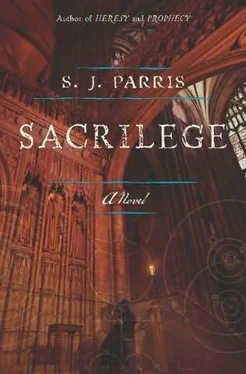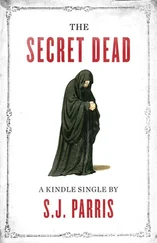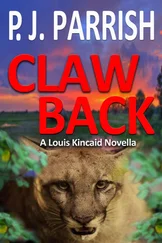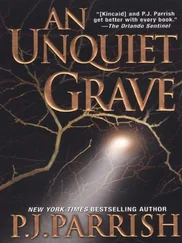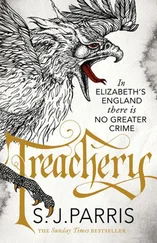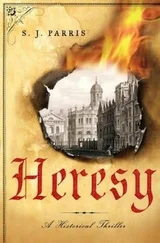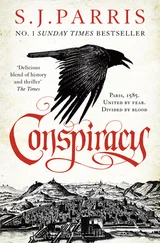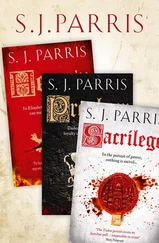“I am interested in the history of Saint Thomas, above all,” I said, with a pleasant smile.
“An unusual field of study for an Italian Protestant,” he remarked, glancing sideways at me as he levered himself up and crossed to the cases against the wall, stacked high with a jumble of books in precarious piles. Many looked to be in poor condition, their bindings gnawed by mice, pages spotted with damp. What good was it, I thought, with a stab of irritation, to save books from the destruction of a library only to neglect them like this, thrown together carelessly like corpses in a plague grave?
I thought I detected a note of suspicion in the old man’s voice, so I broadened my smile further.
“I suppose I have always believed we might avoid falling into the errors of the past by understanding them, rather than by burying them,” I said. “Even if we regard them as mere superstition, there is something to be learned about human folly from the legends of our forefathers, do you not think?”
He nodded with a speculative expression.
“Well said. We may as well destroy all libraries if we do not take lessons from the chronicles of history. And now,” he said, folding his hands together and making an effort to smile, “I must get along to the chapter meeting. I will leave you in the care of my assistant, who will endeavour to find you the books you want.” He indicated a morose-looking young man in the robes of a minor canon who was copying something laboriously at a desk in the corner. “Geoffrey! Our guest wants chronicles of the life of Saint Thomas—see what you can find for him,” he called, in a peremptory tone.
Silently, though with obvious bad grace, Geoffrey rose from his seat and made his way without haste to one of the book stacks. I privately doubted whether the young man could find anything on those shelves, but I thanked the librarian and settled at a desk set in an alcove beneath one of the windows, which must once have held a statue when this old chapel was still used for worship. The assistant Geoffrey, who communicated only in monosyllables, made a slow search of the shelves and returned with a small pile of books, which he dropped heavily in front of me before resuming his own task, though I noticed he moved his books and papers to another desk from which he could usefully keep me in his line of sight. I nodded my thanks and began shuffling the volumes with the appearance of interest, wondering how soon I could leave for Langworth’s house without seeming suspicious. The only sound in the empty library was the young canon’s heavy breathing through his mouth and the scratching of his pen.
The first book on the pile was a bound manuscript bearing the title Quadrilogus , clearly of some antiquity, which on closer inspection proved to be a collection of more or less fantastical accounts of the life of Thomas Becket produced by various English and French monks three centuries earlier. Beneath it, the Vita of Robert of Cricklade, a twelfth-century life of the former archbishop. I sighed, flicking idly through the pages, feigning interest and offering an insipid smile to the young assistant whenever he glanced in my direction, which was more often than was strictly necessary. I reminded myself that the surest way to look suspicious was to behave as if I feared suspicion.
The air of the library was thick with the smell of dust and old paper—usually a smell I savoured, but today I felt stifled by it. A damp heat stuck my shirt to my back and inside my boot, the handle of my knife dug into my ankle. I wiped my forehead on my sleeve and leaned my head on my left hand, my elbow propped up on the table as I skimmed the book, feeling an unreasonable irritation clenching like a fist inside my chest. What on earth was I doing here, sneaking around as if I were a thief among men who at best distrusted and at worst hated me, tangling myself in two murders that had nothing to do with me, all for the sake of a woman? Ah, but was it really all for a woman, responded another, more cynical voice in the depths of my mind. Was it not more truthfully your own absurd tenacity, this voice continued, that same dogged refusal to back down that forced you to become a fugitive in your own country and an exile through Europe, living by your wits for the past eight years, because you had to prove that you knew more than everyone else? I pushed my hair off my face and gritted my teeth. Men have committed greater acts of folly than this for a woman before, I countered; in any case, was I not permitted a little licence? Every reckless or impulsive decision I had made in my life until now had been in the pursuit of knowledge. All through the years when other young men were risking their dignity or their lives fighting over women, I had dared everything for the sake of books I was forbidden to touch, in search of answers to questions I had been told I should not ask. Surely now, at the age of thirty-six, I was allowed a little ordinary folly?
Yet, if I were completely honest, I thought, curling my lip as I watched the assistant librarian rummage absentmindedly in his ear with a forefinger and examine the result, my motives were not altogether selfless. If Sophia was cleared of murder, she stood to inherit all her late husband’s property. She would have achieved her heart’s greatest desire—independence. And you think she will share it with you, once she has it? cut in that same mocking voice. Marry you, so that you can stay in England, living off the profits of her first ill-fated marriage—is that what you hope for? You think she would win her independence and give it straight up again—knowing her opinion of men? Do you really imagine she sees you differently?
I clicked my tongue impatiently, causing the assistant librarian to jerk his head up with a hard stare in my direction. I had not confronted the possible end of this adventure so starkly until now, and it was a shock to acknowledge the truth of my own secret hopes. It was a life I had never dared imagine for myself, or desired, until now, because it seemed so far beyond the bounds of possibility: a wife, a home, a secure income, perhaps, in time, children. In Sophia I glimpsed the image of an entirely different future, and for the first time, I found it attracted me. Whether it would hold the same appeal for her was less certain.
Outside in the precincts the great bell swung into life, tolling the hour that signified the beginning of the chapter meeting. I flicked through another few pages, watching the young assistant Geoffrey, who had returned his attention to his work, his tongue poking out of the corner of his mouth as he frowned in concentration. I was on the point of closing the book when I glanced down and one of the illustrations caught my eye. It was a plan of the cathedral, made at the time the first shrine was built. The crypt was clearly marked, as were all the chantry chapels that stuck out like fins either side of the vast body of the cathedral, as if it were some enormous sea creature. I peered closer; the treasury was not marked—it must have been built later—but the chapel it adjoined was drawn and someone had marked in ink over the book’s original plan a square shape with a dotted line, overlapping between the side chapel and the crypt. There were lines showing a staircase. Beside it, this unknown hand had written “sub-vault. Sometime prison.” Was this another way into the crypt, from beneath the treasury? The map was old; I wondered how many people knew about the sub-vault.
I closed the book and pushed my chair back.
“Thank you for your help,” I said to the assistant librarian, my voice sounding unnecessarily loud in the still air. “I’m afraid I must leave, but may I come back and read further tomorrow?” I indicated the pile of books; he gave a grunt that may or may not have been assent, and it was all I could do to keep myself from tearing down the stairs in my haste to get to Langworth’s house.
Читать дальше
Конец ознакомительного отрывка
Купить книгу
